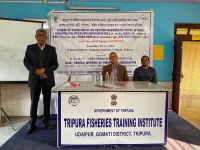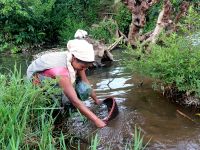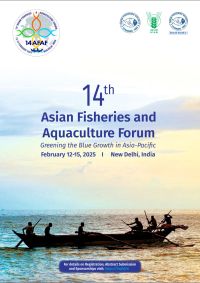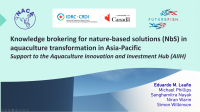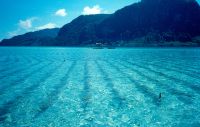Small indigenous fish species (SIS) are a rich source of essential nutrients, including proteins, vitamins, and minerals, making them a vital component of rural diets. Despite their nutritional significance, SIS are often undervalued and excluded from aquaculture in favor of larger commercial species.
This study highlights an initiative by ICAR-CIFA in Tripura to promote and protect small fish species through sustainable farming practices. Training programs were conducted to educate local farmers on breeding, feeding, and rearing techniques tailored to SIS. Live food production was emphasised to improve larval survival rates, and mixed-species culture strategies were developed to enhance production efficiency. The initiative demonstrated that small fish farming is a viable livelihood option, particularly in backyard water bodies, providing food security, income generation, and biodiversity conservation.
Northeast India faces significant nutrition security challenges, particularly in rural and tribal areas, where high stunting and anemia rates persist despite high per capita caloric intake. This article explores sustainable freshwater snail farming as a viable solution to address these nutritional deficiencies while enhancing rural livelihoods.
Freshwater snails, such as Pila globosa, Bellamya bengalensis, and Brotia costula, offer high protein content and essential minerals, particularly calcium and iron. Their nutritional value surpasses many plant-based protein sources and compares well with traditional livestock products. The study outlines three practical snail farming systems suited to different farming conditions. Economic analysis reveals that a small-scale backyard system can generate up to 1,800 kg of snails annually, yielding a 272% return on investment within five months. With proper training, infrastructure, and market linkages, freshwater snail farming can play a useful role in improving food security, economic resilience, and rural development in Northeast India.
The 14th Asian Fisheries and Aquaculture Forum (14AFAF) will be held from 12-15 February 2025 in New Delhi, India. Submission of abstracts has been extended until 5 November, and early bird registration closes on 10 November, so get in quick!
The forum is a scientific meeting organised by the Asian Fisheries Society (AFS) once every three years to understand the global trends and address issues and challenges faced by the fisheries and aquaculture sector. The main purpose of this Forum is to provide an international platform for eminent scientists, young researchers, and other stakeholders across the globe to share their research experiences and innovative ideas. By facilitating the exchange of diverse range of knowledge and expertise, the Forum with the Theme ‘Greening the Blue Growth in Asia-Pacific’ aims to address key issues towards developing sustainable fisheries and aquaculture.
This presentation provides an introduction and overview to the project "Knowledge brokering for nature-based solutions in aquaculture transformation in Asia-Pacific: Support to the Aquaculture Innovation and Investment Hub". The project contributes to NACA and FAO's work on aquaculture transformation, which aims to create more efficient, inclusive, resilient, and sustainable food systems through innovation, investment, and partnerships.
NACA is developing an Aquaculture Innovation and Investment Hub (AIIH) to help realise this vision in the region, providing a facility that will bring together innovators, startups, and investors to accelerate transformation. The presentation was given at the project inception workshop on 4 June 2024 in Bangkok. The project is funded by Canada's International Development Research Centre.
This project contributes to NACA's recent work with the FAO on aquaculture transformation. The aim is to create more efficient, inclusive, resilient, and sustainable food systems through innovation, investment, and partnerships. NACA is developing an Aquaculture Innovation and Investment Hub (AIIH) to help realise this vision in the region, providing a facility that will bring together innovators, startups, and investors to accelerate transformation. The project will contribute to developing National Innovation and Investment Plans for Thailand, The Philippines, and Fiji, which will address issues including climate change, disease prevention and management, environmental sustainability, gender equality and social inclusion, and resource utilisation and management. The project is part of a wider AQUADAPT initiative, a four-year partnership running from 2023-2027, funded by Canada's International Development Research Centre.
